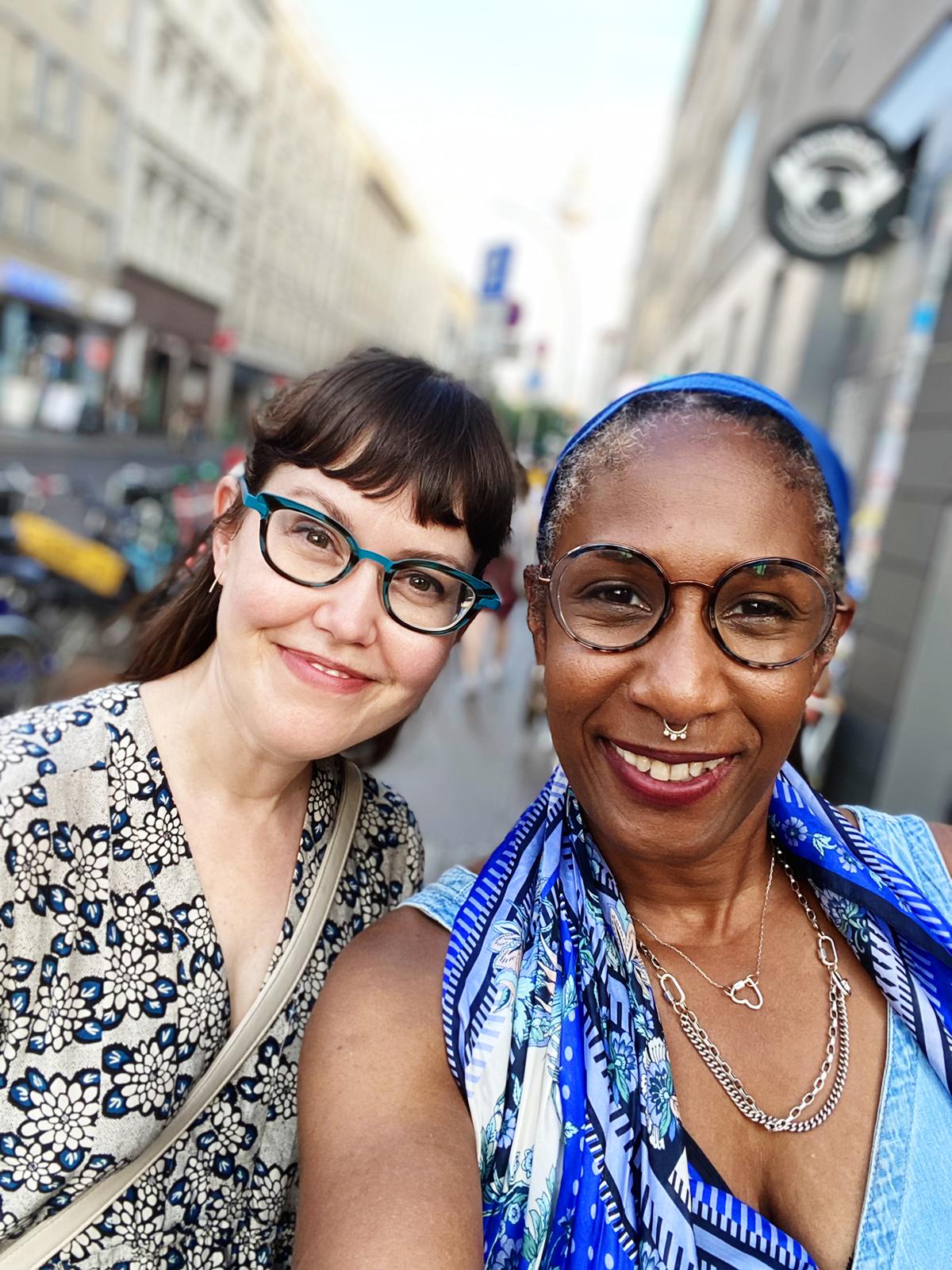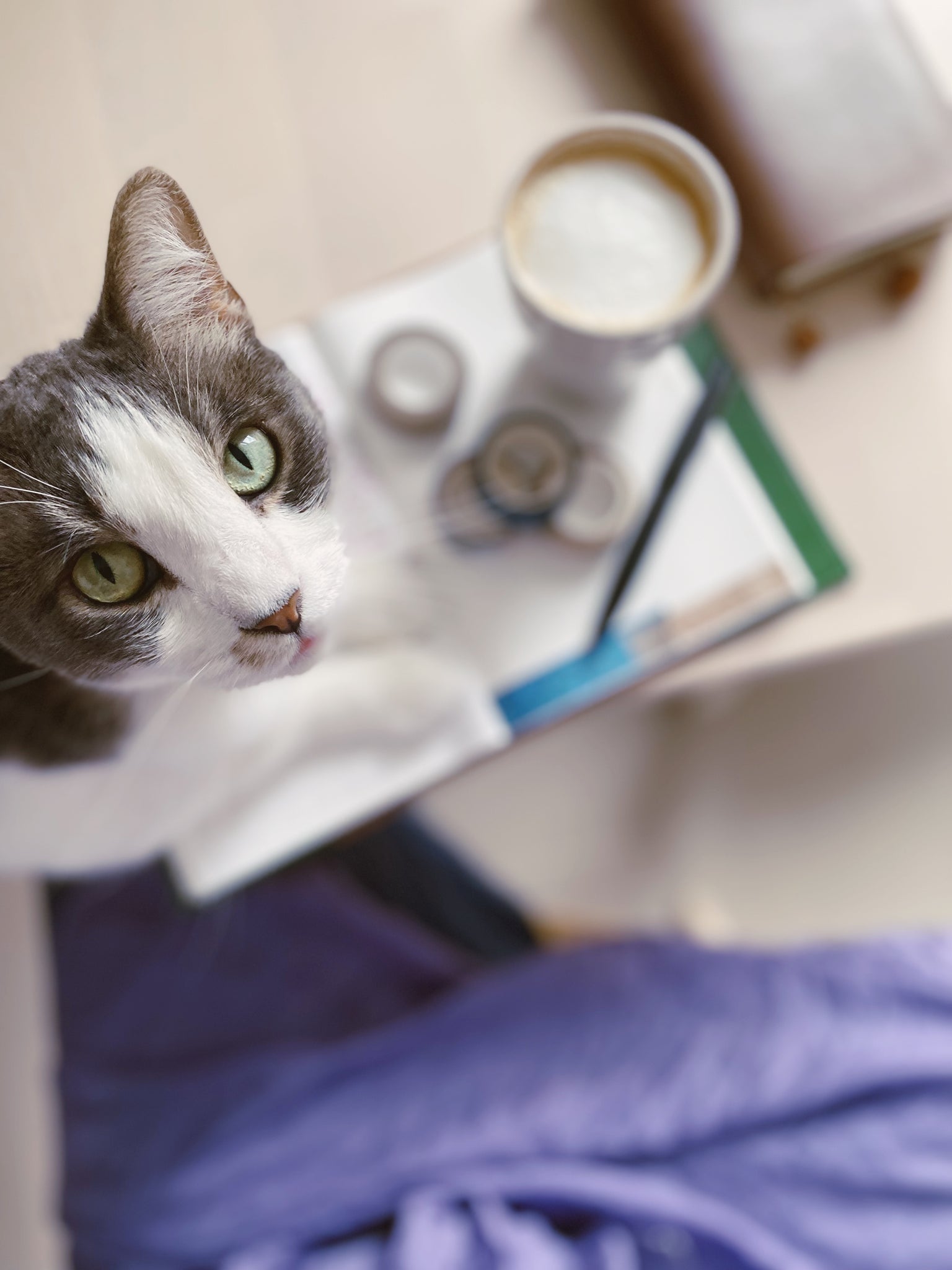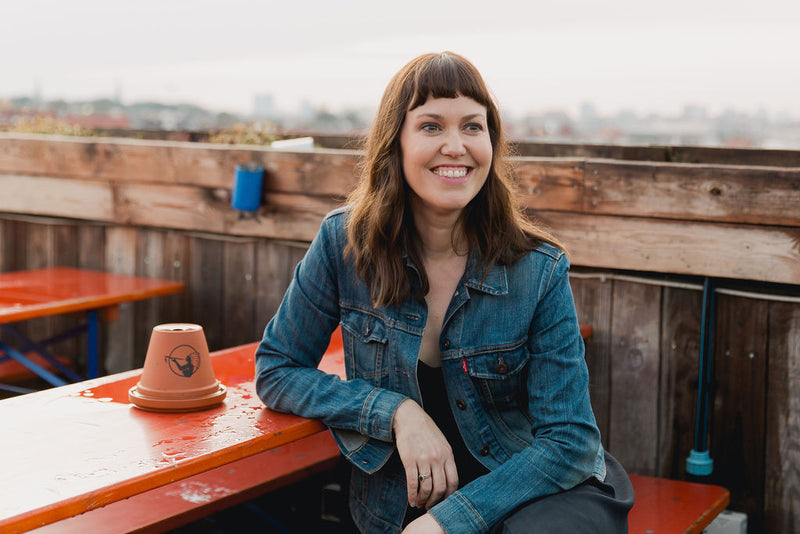It is a challenge to find the perfect words to introduce Caroline Donahue to you because she is amazing in so many different ways, but I am going to try. I first met Caroline Donahue through Instagram. She began following me back in the days when my Instagram handle was @ninjatraveling, and I was sharing quite a bit about the challenges I was facing in my life through my journaling, in addition to offering journaling ideas and tips. I then got to know her and her work better. She is a writer and book coach, as well as a longtime keeper of diaries, journals, planners, and notebooks. In addition to teaching courses, editing, proofreading, and coaching writers, she is also the host of the podcast The Secret Library, in which she delves into the world of writing. I was honored when she asked me to be her guest for Season 3, Episode 1, in 2020. In that episode, we talked about the bridge between and transitioning from private to public writing. I cannot believe how long ago that was. The latest episode of her podcast Season 8, Episode 10 was published in May 2023!

Most recently, I had the opportunity to meet Caroline face to face, when I was visiting Berlin with my sons and our good friend, Jeffrey, in July 2022. Caroline was born and raised in the Baltimore, Maryland area of the US, and lived in various places in the US before falling in love with and relocating to Berlin with her husband, around five years ago. I continue to find it to be magical, the many ways that my notebook, all of our notebooks, and our interest in the practice of reflective writing have brought me together with so many people and all of us together with one another. Caroline is deeply committed to the craft of writing, in its many iterations. She is creative, multifaceted, deeply thoughtful, and fun, and I am so delighted to have the good fortune of introducing her to you, the BK community.
CAROLINE DONAHUE
Most of the Notebook People that I’ve interviewed can recall their first notebook or diary or journal, and many can remember precisely what it was that inspired them to begin their writing journey. For most of us, writing is such a significant part of who we are that these are core memories that are cemented on the timelines of our lives. For me, it was the children’s book, Harriet the Spy by Louise Fitzhugh, in which the main character, Harriet, kept a notebook in which she wrote her observations of friends and family. After that, I wanted a notebook of my own, so I could do the same thing. Eventually, my process would become my own, and I stopped spying on friends and family. Well, sort of.
But for Caroline Donahue, this month’s Notebook Peep, the book that inspired her to keep a diary/journal/notebook was a much more serious book. For her it was The Diary of a Young Girl, which is the story of Anne Frank, a young German-born Jewish girl, whose family was forced to hide in an attic in Amsterdam to try to survive the Nazi invasion in Europe. Right before going into hiding, Anne received a diary for her 13th birthday, and spent a lot of time reading and writing, while she was in hiding. At some point, she heard the plea and the Dutch Minister of Education, over the radio, asking people to hold onto old war documents and diaries for historical purposes. She then made the decision to rewrite her diary, as one long story, with the hopes of one day sharing it with the world.
Eventually, Anne and her family were captured by the Nazis and she was sent to a concentration camp, where she died from typhoid in 1945, at the age of 15 or 16 years old. The people who’d helped her family hide in Amsterdam had found her journals and put them away, in the hopes that Anne would survive and one day return for them. Of her family, however, her father was the only survivor, and when he returned, the journals were given to him. These journals, which Anne kept as a young girl, have been preserved as a memoir about the Holocaust that has been translated into more than 65 languages and adapted into numerous movies and plays. Her work is a testament to the power of personal writing and the impact that it can have for generations to come, which has made me think about my own notebook legacy.

At the time Caroline began keeping a diary, she was 11 or 12 years old and experiencing traumatic shifts in her own young life, and though the events in her life were not nearly as horrific as those experienced by Anne, they were the worst thing she would yet experience, and because of that she felt a deep connection to Anne and the maturity and wisdom she seemed to exude. In her diaries, Anne usually addressed her entries as letters to an imaginary friend, Kitty. Caroline also wrote her diary entries, as letters, and hers were addressed to Anne Frank. She felt that Anne, with her hard won wisdom and insight, would be better able to understand what she was going through than her own friends.
Caroline doesn’t recall exactly when she stopped addressing her letters to Anne, but her preteen/teenager process eventually changed, as most people’s processes do. In fact, when asked what she wanted to share with other that relates to her process, she wrote “...there’s no right or wrong way and also that my method changes all the time – I switch size and format and approach a lot…..so, I’d say try not to get rigid or feel that you have to find one method to rule them all.” This is a great reminder to people like myself, who can be a bit rigid and unnecessarily inflexible when it comes to my own processes. Being flexible allows one to evolve organically, all the while growing through our writing.

For work, Caroline currently uses an analogue calendar by Mark + Fold, a British company that is new to me and offers minimalistic calendar options. This is bundled with a Stalogy notebook in a Roterfaden for work. And in a Chic Sparrow notebook cover, she has a number of notebooks designated for different uses that align with her writing process. What struck me was how much was actually written in these various notebooks. Her notebooks are workhorses. They were thick and full of notes and a few stickers here and there. Every notebook had a specific purpose and she understood her system and explained it well and with the enthusiasm that only true Notebook People possess.

Our conversation was long and it was delightful. We talked about everything from to-do lists to how journaling differs from fiction and nonfiction writing to how Caroline uses tarot cards with both her journaling and writing practices. Caroline and her father believe that there are two types of people: those who write to-do lists and will check things off from that list and those who will add things that they’ve done to a list and then check those off to feel that sense of accomplishment. She and her father are the latter. I am sure that many people can relate to this. Even though it is not a regular habit of mine, I have done it more than once. Our conversation turned to the tarot cards because that was one part of her practice that I have not spent a lot of time exploring with any of my Notebook Peeps.

Whenever I think of tarot cards, I think of fortune telling and psychics, but Caroline does not use them in that way. She went onto explain her practice with tarots cards like this:
And the thing about the Tarot that I love, and I think that works really well for writing, but also we tell stories all the time about what our lives are like. So, to me, in some ways, they're not really different. It's just whether or not these people exist in an identifiable way in our reality is the difference between fiction and nonfiction. Because good fiction, those people feel real, um, whether they live in some kind of space world that is not recognizable to us or however that world is happening. And so I feel like there's a lot of, like, when we first have ideas about fiction or writing stories, and sometimes even when we just have emotions about our life, there's a lot that's nonverbal. It's just kind of this felt sense that's there and there is something about pulling an image while holding that felt sense that, um, creates a bridge.
This struck me as so profound that for the first time in a long time, I’m actually considering incorporating tarot into my own journaling practice and have ordered a new deck of cards. I have a deck of tarot cards that I received at a good friend's birthday party, where we were taught to use them, but I found Caroline’s explanation much more relatable, and I’m excited about that. I ordered the original Rider-Waite deck that she recommended for beginners, which I should have by the publication date of this story. Caroline explained that there are oracle cards and tarot cards, and that she prefers tarot cards because they aren’t all positive like oracle cards tend to be. She explained, “So, the thing about Tarot is that you have cards like Death, like The Devil, like The Tower, when everything goes to shit. I feel that in fiction, uh, those can't be avoided. So when I pull those cards, I don't get scared. I'm looking at them as validation, or is this the end of a process? Is something changing? Is there loss here? Is there grief here? I don't think those should be ignored.” This really resonated with me, as I have come to honor all of my own and others’ emotions, whether they are positive or negative feelings. All feelings are valid and all feelings provide us with important information.

I should note that Caroline has written a book about tarot cards and also has an online class. She mostly uses tarot to help her move through her fiction writing, but will sometimes pull cards for herself with her morning coffee. She was kind enough to create a link to her tarot card guide, especially for Notebook People! You can find it by clicking here, a free download with lots of information to get you started. Additionally, if you are interested in learning more, you can find the link to her course here. Lastly, I thought you might like to listen to our episode on her The Secret Library podcast, which can be accessed here.
I am always grateful for the opportunity to talk with others about their processes, as I find the many different ways that people engage with something as basic as a notebook and a pen to be so interesting. This interview left me feeling so much more playful and free because, even though Caroline is very serious about the work that she does, she has enthusiastic, adventurous energy and a willingness to do things that are outside of the box, alongside some much more conventional and traditional practices. She is both hugely productive and professional and also a lover of stickers and a user of tarot cards. And I say that as though it is unusual for people to be all of these things, but I’m learning that it is actually common that many, or most, or all of us contain multitudes. A huge thank you to Caroline for her joy and this important and necessary reminder.


This was a fascinating interview. Thank you for the link to The Secret Library podcast! I’m really enjoying it.
What a delightful interview; wish I could meet her. I listened to her podcast interview with you and took a lot of notes! Thoughtful, creative, and insightful conversation. I especially appreciated the comments about personal writing and therapy. I never thought of that before – ending one’s writing session, like one’s therapy session with intention and not just venting. Excellent.
What a delight it was to have this conversation with you, Trina! I’m honored to be included in a series I’ve admired the whole time you’ve written it. Viva notebook people!